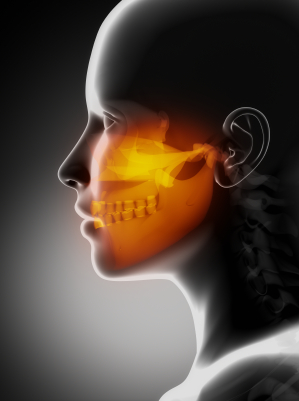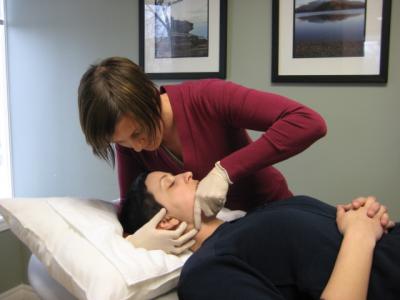Greetings
We hope that you had a fantastic summer. September has flown by - with the first hints of winter now in the air!
In the past month we have added over 100 new FAQ and Research articles to our patient education resource. We have also added the following patient guides:
- Hip Surgery (Hemiarthroplasty)
- Avascular Necrosis of the Hip.
- Scoliosis
In this newsletter we are discussing Jaw Pain. We are also pleased to inform you of an Presentation by Alison Shafer, Parenting Expert and Author, on "Power Struggles tips to get you and your child off the battle field". She will be speaking at the Aeolian Hall on Wednesday October 3rd from 7-9pm. Please click on the link for more details as tickets are still available at the clinic.
Of course these two topics are not necessarily related...but they could be!
Featured Article: Dealing with Jaw Pain
 If you are experiencing pain while biting or chewing, tenderness in your jaw, pain in and around your ears, or headaches, then you know what it feels like to have jaw pain. There are a number of factors that can cause jaw pain, making it hard to treat. Possible causes of jaw pain include: toothaches, infections, sinus problems, gum disease, teeth grinding, arthritis, or jaw problems related to injuries.
If you are experiencing pain while biting or chewing, tenderness in your jaw, pain in and around your ears, or headaches, then you know what it feels like to have jaw pain. There are a number of factors that can cause jaw pain, making it hard to treat. Possible causes of jaw pain include: toothaches, infections, sinus problems, gum disease, teeth grinding, arthritis, or jaw problems related to injuries.
Many people also suffer from temporomandibular joint pain or TMJ pain, which refers to pain in the jaw joint specifically. This joint is made up of muscles, tendons, and bones, and injury to any of these structures can cause pain in the jaw. Symptoms of TMJ include: sore jaw muscles, ear pain, headaches, pain in the cheeks or temples, jaw clicking or popping, difficulty opening one’s mouth, and/or locking of the jaw.
To help you reduce jaw pain or TMJ pain so that you can regain your comfort and enjoy eating all your favorite foods, here are a few tips from your physiotherapist.

Cheryl Richardson has advanced training in TMJ joint dysfunction. She works with specialist dentists and surgeons as part of the multidisciplinary approach to TMJ pain management.
If you think you are suffering from TMJ-related pain you should contact a qualified professional in order to diagnose TMJ problems. If TMJ dysfunction is diagnosed early on, the following home-remedies can help improve your symptoms:
Take excessive pressure off of your jaw muscles and joints by eating soft foods and avoid chewing gum.
Try to avoid clenching, tensing, or grinding your teeth. Clenching is one of the most common causes of TMJ pain.
Relax your muscles by applying moist heat to your jaw twice a day for at least half an hour, or try gently massaging the muscles in your cheeks and temples.
If your TMJ pain is the result of an injury, ice packs can be applied to the area to reduce swelling.
For more tips on how to safely and effectively reduce your jaw pain, talk to the trained, physiotherapists at SKYE HEALTH. We would be happy to assess your current jaw pain and create a program tailored specifically to your needs and goals. Call SKYE HEALTH to make an appointment or to ask any questions you may have.
Please see our new Pilates & Aquatic Therapy Schedule for October 1st- December 20th. We will be informing you of an exciting new addition to our team and expansion of our clinic space in mid-October.
We look forward helping you in your journey to health,
The Skye Physio Team
References
- Rollman A, Visscher CM, Gorter RC, Naeije M. Care seeking for orofacial pain. J of Orofac Pain. 2012; 26(3):206-14.
- Tuz HH, Onder EM, Kisnisci RS. Prevalence of otologic complaints in patients with temporomandibular disorder. Am J Orthod Dentofacial Orthop. 2003; 123(6):620-23.
- Schiffman E, Ohrbach R, List T, et al. Diagnostic criteria for headache attributed to temporomandibular disorders. Cephalagia. 2012; 32(9):683-92.
- Kluemper GT, Hiser DG, Rayens MK, Jay MJ. Efficacy of a wax containing benzocaine in the relief of oral mucosal pain caused by orthodontic appliances. Am J Orthod Dentofacial Orthop. 2002; 122(4):395-65.
- Hersh EV, Stoopler ET, Secreto SA, Derossi SS. A study of benzocaine gel dosing for toothache. J Clin Dent. 2005; 16(4):103-8.
- Poveda-Roda R, Bagan JV, Sanchis JM, Carbonell E. Temporomandibular disorders: A case-control study. Med Oral Patol Oral Cir Bucal. 2012 (in press.)